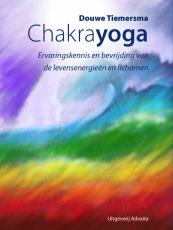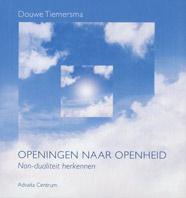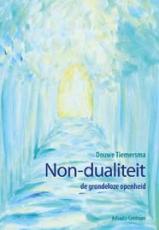Advaita Post #12-11 - The only point is that you consciously recognize...
Volume 12 No. 11 (August 1, 2011)
--- The only point is that you consciously recognize your inner truth and that you take it seriously, including the consequences ---
Where is the power and the glory?
Text: Independence (Part 3)
From a talk in Gouda, March 30, 2011
It is difficult to find clarity about the area of "I am", just to realize that you are. Then you are awake and that consciousness disappears again when you reenter into the dream of the world. When you go off in search of yourself once again, there's really nothing there.
So it's about a surrender with an internal awareness. What does it mean that there is a surrender at a certain point, when for example you are sucked out to sea?
That's a sort of attitude you almost can't take.
There is no attitude here that you should be able to take. You can always become more sensitive to it and then, while you remain with yourself, at some point it will just happen.
Then where are you focused? On your sense of self, on your being, or on the nothing that lies behind it?
Let your awareness remain infinitely open. In that sphere your being-awareness will open. Let the process of infinite release continue, up to and including the complete surrender. As long as you notice that somewhere, something still has a name and form, you will need to take note of that and let go.
When something receives a designation, you experience it as a thing with an independence in relation to self-being. This separation in being-awareness disappears with the ongoing release.
Is it possible to take this step?
It's not a step. Surrender is precisely the release of all initiative and of any notion 'I can'. You can just stay on the edge of your existence in a very sensitive way. You know approximately in which direction the development goes, namely an ongoing release until there is the complete surrender. Stay there. Then it goes further by itself. Don't hold on to any concepts. In a certain referential context concepts such as the witness, sat-chit-ananda, I-am, are quite useful, but at a given moment there is nothing other than self-being in which everything dissolves. Internally there is a knowledge of it, a knowledge without distance, a being-knowledge.
In the Yoga Sutra there is a whole series of 'samâdhi's' listed. Samadhi is a totality of one-being, a coincidence of subject and object, of which there is an internal knowledge. Samadhis come in many varieties. Initially, there are still thoughts remaining, then all kinds of emotional structures.
At a certain point all forms dissolve, including that of yourself. That is no longer a state of a person who is meditating. No it is a total event, in which the situation fundamentally shifts.
Then you no longer have a notion of it?
There is no one with a notion of it and yet there is a knowing of openness. To the extent there is a knowledge of it, it has already become a creation. Then you just imagine it once again. The formless knowing is there as a being-knowing of your own open dimension. Let the dimension of the total openness open - and that can happen, even as phenomenon return again. Then the openness without ground can remain, because there is a being-knowing of it. To the extent there is again a specific situation, the knowledge is again a creation of a self-being and 'I know it'. That's okay, as long as the groundless dimension just remains open. Then the openness remains the broad context of self-being, in which everything arises and again disappears.
How can you become stable in that?
By simply remaining there continually. Then it will stabilize itself. When you think that you have to do all sorts of things in the world there is contraction again. Just see that it is possible to be yourself without becoming wrapped up in anything, even while all sorts of activities continue.
Afterwards it's very easy to affirm, but during the activities it's difficult.
We have done all kinds of exercises in order to make it clear, for example walking without walking. There's walking, but what about yourself? "Yes, I walk." What about yourSelf? "I am free - I don't walk." Isn't that right?
And that applies to everything - to ideas, and so on, but you're still stuck.
Stay very sharp and clear so that you can break through the automatic tendency to reattach yourself. That connection is an identification of yourself with the image of yourself as someone who does something. "I walk, I will, I think, I do this, I desire that." You will want to see the limitation and identification with such clarity that it is broken through.
A certain commitment is required for that.
It only works with a total commitment. Otherwise it doesn't work.
How can you help yourself with that?
It's more about a direct recognition, for example, now I say certain things and there is a certain resonance within you. Stick with that resonance, because you recognize its value. That is your first commitment: "I see there is something of importance there." Because you find it important, you already give it a certain focus, a dedication. When you find it important enough, then don't you just naturally stay with it constantly?
The worries can be great.
Do you take the consequences of what you see as important? Sure, when you find it's important enough! And if you don't find it important enough, then no. Then you continue to complain. Take a look at all the people who just sit complaining... The tendency is very strong in human beings. When you are diagnosed with cancer, many people dive into the role of the victim. "Now I'm caught and it's bad, it's really bad; me again, of course." Sliding into such a state happens very easily. Then you are the product of conditions. You have to take a look at how restrictive this identification is, the sentimentality that it contains.
So it's about the insight that arises in your own sphere, the liberating insight that you immediately recognize as valuable. That's the issue. Also with the teaching. Then the words and the teacher are no longer important, but rather the insight into yourSelf which breaks through. It breaks through by itself, when you come closer to yourself. Then it opens up your inner truth that is always already there. The only point is that you consciously recognize that and that you take it seriously, including the consequences.
Text "du muss dein Leben ändern"
"You must change your life". That is a statement from Rilke, which the German philosopher Peter Sloterdijk has chosen for the title of his recently published book (Boom, Amsterdam). Sloterdijk starts from the insight that society cannot continue on its current path. Therefore it is necessary to steadily practice as ascetics in all cultures have done. Through this they insured that mankind would reach a higher level ethically. Man is the animal that through his 'antropotechnick' he gives himself form through exercise. In addition, he uses symbols and ideas to protect himself against less attractive fates and the confrontation with death. So every religion is an "immune system" against the dangers he fears.
Although I have not read the book (512 pages) but only some secondary texts, I make two remarks.
1. It is remarkable that attention is given to spiritual practice from academic philosophy and that this practice is deemed necessary. This philosophical insight will thus need to proceed towards the existential level in order to become a reality. That is realization. See also Chapter 1, "Philosophy: existential, spiritual and intercultural' from Verdwijnende scheidingen - proeven van intercultureel filosoferen [tr: Disappearing Separations - samples from intercultural philosophers].
2. Like (almost) all academic philosophers Sloterdijk holds on to the naturalistic view of man as a person who together with other people creates a society and thought structure in which he can live. This includes practices which would lead to immunity against the fear of death, such as genetic interventions which can strengthen immunity to viruses. The whole world of ideas and symbols, thus the whole of spirituality, is employed in this defense.
You see the limitation of this view when you yourself have committed or followed a spiritual path. What happens there is something else, namely that there is a realization of a different kind of reality than existed previously. Through your practice you change your self and so your whole world changes. The person structure disappears and so also the personal world. That change is not so much in the area of ethics, as claimed, but on the (ontological) level of being. There are countless possible worlds and their corresponding forms of self. True spiritual practice means a change in the properties of self-world, subject-object, in the direction of space and non-duality, beyond all boundaries (see Non-dualiteit - de grondloze openheid [tr: Non-duality - the groundless openness], Chapter 3, "The non-duality of situations"). Through it everything changes radically. When there is the insight "that society cannot continue like this", it is the one direction in which real change is possible...
Announcements
The activities of Douwe from September onwards naturally have the caveat that his health remains good. This applies to everyone, so there are some plans.
Monday evening yoga and meditation on September 26, October 24, November 14 and December 12 (possible sequel in 2012), the yoga of 19.30 - 20.45 and the meditation 21.00 - 22:15. Costs 40, -.
There will also be a Chakra Yoga training, on Sept. 3, Oct. 8, Nov. 5, Dec. 10, 2011 - possibly continued with three classes in 2012. Time: 10.00 - 16.00. Cost € 240, - for the first four lessons. Registration, secretariaat@advaitacentrum.nl.
In the autumn there will be no weekend in Hoorneboeg. For the spring of 2012 a weekend is planned: 10 to 11 March.
Pia de Blok offers a new course for the Advaita Center in the fall of 2011, " Unlimited relaxation for young people with insight into nonduality". It is intended for youth workers, yoga teachers, parents and others interested, on three Saturday mornings from 10.30-13.30 hours. Dates: November 12, December 10 and January 14, 2012. See the website announcement: Unlimited Relaxation Training.
Er is geen tweeheid
als je ontspannen bent
in zelf-bewustzijn
is dat duidelijk.
Boeken
Douwe schreef en redigeerde gedurende zijn leven boeken. Via onze uitgeverij zijn deze nog verkrijgbaar.



